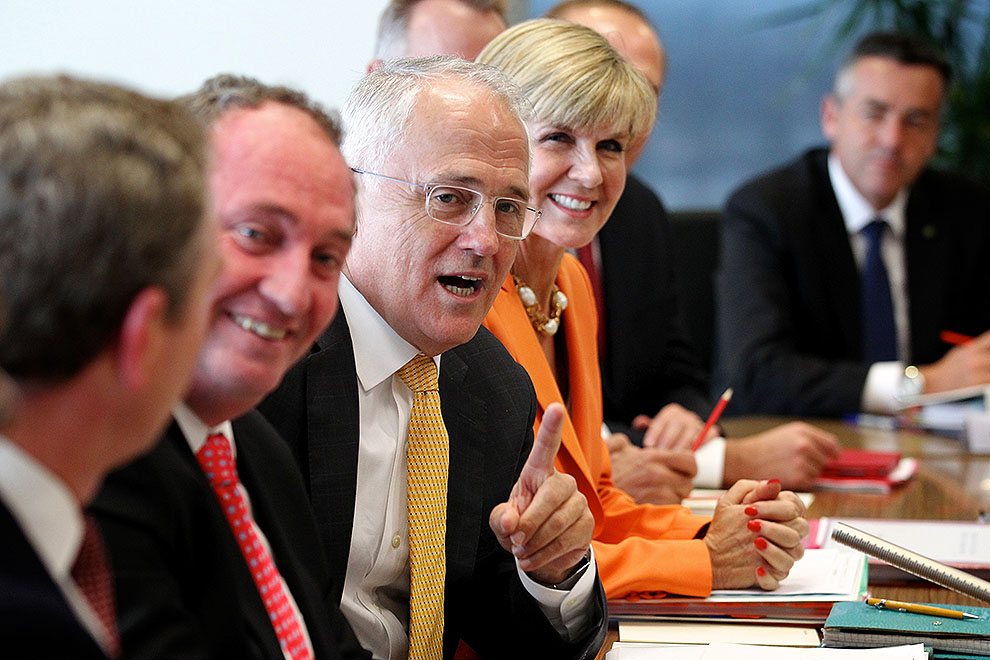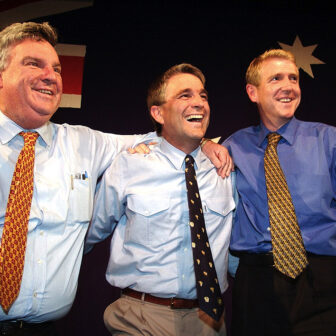When Kevin Rudd began his fleeting second prime ministership in mid 2013, he immediately set about filling the gaping authority vacuum that had troubled Australians for three years. His every move was aimed at generating incumbency, reassuring Australians that finally someone was in charge, someone they could trust.
Some elements of the exercise, such as lining up almost a hundred foreign diplomats for a meet and greet, were excessive; others, like the challenge to opposition leader Tony Abbott to a Press Club debate on government debt and deficits, were inspired. (Abbott declined that invitation and Rudd attended solo but then largely wasted the opportunity.)
As usually happens after a major leadership change – whether it turns out to have been a good idea or not – the opinion polls responded positively, with the government either drawing level with the opposition after preferences, or sitting slightly ahead.
Bob Carr, foreign minister at the time, recalls in his published diaries an encounter with a “pensive” opposition leader, who reflected fatalistically, “Well, you never know where it goes in this game. The people seem to like Kevin.”
But the polls soon soured again and the old Rudd returned: the one who flitted from thought bubble to brainwave, in search of that elusive bounce. Hey, let’s have an economic zone in the country’s north! No subsequent poll improvement. Okay, how about this: why don’t we move the country’s naval base from Sydney to Townsville?
Did anyone in the prime minister’s entourage contemplate how this flaky behaviour appeared to voters? By the time of the first campaign debate, a desperate prime minister had discarded any skerrick of dignity and spent much of the time bleating about the Coalition’s secret plan to raise the GST. In a zero-sum game, Abbott’s stature grew before our eyes.
Labor insiders believed they had no choice: the polls were turning and the kitchen sink was required. But from a distance it looked like unnecessary panic. Rather than obsess over the opinion poll trajectory, Rudd would have been wiser working out how to give voters an election-day choice between a high-brow, wonkish incumbent and a volatile, boyish challenger.
In 2016, Malcolm Turnbull sometimes gives a half-decent Kevin Rudd impersonation. In the past few weeks two high-profile policies have popped out of nowhere: handing income tax powers back to the states, and pressing ahead with the very fast train. The first was astonishingly reckless and frightening to the voter, the second innately appealing to Australians. On top of earlier GST and negative-gearing outbreaks, though, semi-engaged voters are getting a message: Malcolm is desperate to come up with something, anything, any big idea, for the election.
Once again, does the prime minister’s inner circle understand how much this undermines Turnbull’s authority? It’s as if he has been consuming too much political commentary – that he’s read how Labor has “seized the policy initiative” and decided the government must catch up. Why? Because the scribblers say so.
Yet governments – with the exception of the Howard government’s near-death 1998 GST experience – have tended not to take big plans to elections. Yes, this year the opposition has unwisely lumbered itself with a large-target housing policy, but the Coalition should see that as a gift, not a bid to be matched.
In his apparent attempts to turn the polls, Turnbull is in danger of shrinking, Rudd-like, in the eyes of voters.
Dipping in the polls used to be no big deal. Federal governments usually spend long periods running behind. The first Hawke government, 1983–84, was the last one that didn’t.
Why the poll panic in modern politics? At a fundamental level, the 2008 global financial crisis, which ended that long period of easy, breezy, open-wallets economic growth, is the chief driver of instability. It is part of the reason it’s been so long – twelve years –since a federal government was re-elected with a working majority.
But something more must set Australia apart. Perhaps it’s a slavish belief in the power of opinion polls. The government fears that if the polls drop further it will make a recovery in support more difficult – as if surveys are not just imprecise tools for measuring particular moments, but possess gravitational pull on future instalments and on elections.
This only happens if bad polling leads to misguided attempts to correct the polls. Viewing polls as ends in themselves was traditionally seen as a particularly Labor defect, but maybe it’s just a function of party pollsters swallowing their own press. The idea that a party generates a polling boost, which it then takes to an election, belongs nowhere outside a comic book. Yet one gets the impression such thoughts are common among our political strategists.
Labor’s continuing, stubborn neglect of its Achilles heel – the fact that most Australians believe the party is responsible for the government’s fiscal hole – should guarantee re-election for the Coalition. But rather than contemplating the choices voters will face on election day, the prime minister seems preoccupied with the here and now, fussing about this month’s surveys, or the narrative, or something called momentum.
Once upon a time, before Kevin Rudd, prime ministers were confident or arrogant enough to dismiss the apparatchiks’ loopier, deterministic, market research–driven recommendations. Turnbull was supposed to represent a return to the old template. So far, that hasn’t happened. •





